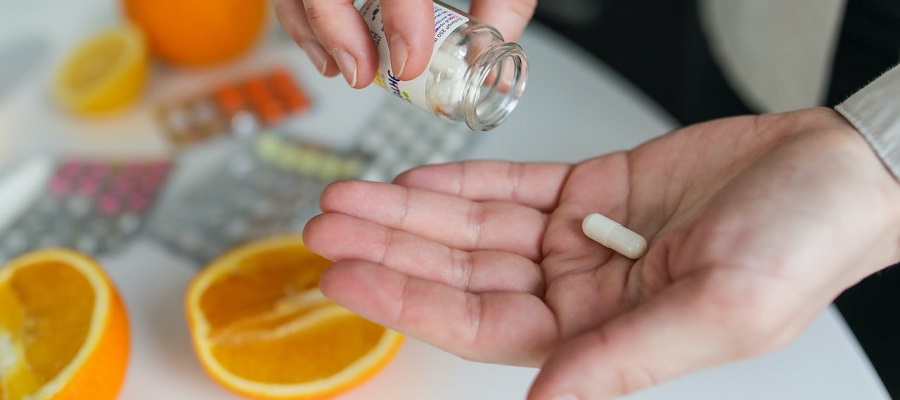Biotin is a water-soluble vitamin that is part of the B-vitamin family. It is also known as vitamin B7 or vitamin H. Biotin is important for the metabolism of carbohydrates, fats, and proteins and plays a role in the production of energy in the body. It is also necessary for the healthy growth and development of hair, skin, and nails. Biotin can be found in a variety of foods, including egg yolks, nuts, seeds, and legumes, and it is also available as a dietary supplement.
What is biotin good for?
Biotin is essential for the metabolism of carbohydrates, fats, and proteins and plays a role in the production of energy in the body. It is also necessary for the healthy growth and development of hair, skin, and nails. Some research suggests that biotin may have other health benefits as well, including improving the symptoms of diabetes and helping to reduce inflammation in the body. However, more research is needed to confirm these potential benefits.
Biotin is also often recommended as a dietary supplement for people with biotin deficiency, which can cause hair loss, dry and scaly skin, and brittle nails. Biotin deficiency is rare, but it can occur in people who have certain medical conditions or who take certain medications that interfere with biotin absorption or metabolism. In these cases, taking a biotin supplement may be helpful in preventing or treating the deficiency.
It is important to note that while biotin supplements may be beneficial for people with biotin deficiency, they are not necessary for most people, as biotin is found in a variety of foods and most people get enough biotin from their diet. Additionally, biotin supplements have not been proven to be effective for improving hair, skin, or nail health in people who are not biotin-deficient.
What foods contain a lot of biotin?
Biotin is found in a variety of foods, including:
- Egg yolks: One large egg yolk contains about 10-25 micrograms of biotin.
- Nuts and seeds: Nuts and seeds are good sources of biotin. Examples include almonds, peanuts, pecans, walnuts, and sunflower seeds.
- Legumes: Legumes, such as beans, lentils, and chickpeas, are also rich in biotin.
- Meat: Meat, particularly liver, is a good source of biotin.
- Fruits and vegetables: Some fruits and vegetables are also good sources of biotin. Examples include avocados, sweet potatoes, and raspberries.
It is important to note that the amount of biotin in foods can vary based on factors such as the specific food, how it is prepared, and how it is stored. Additionally, biotin can be lost during food processing, so it is important to consume a variety of biotin-rich foods to ensure adequate intake.
Can biotin regrow hair?
Biotin is also necessary for the healthy growth and development of hair, skin, and nails. Some people believe that taking a biotin supplement can help to promote healthy hair growth, but there is limited scientific evidence to support this claim.
Biotin deficiency can cause hair loss, and taking a biotin supplement may be helpful in preventing or treating the deficiency. However, biotin deficiency is rare, and most people get enough biotin from their diet. Additionally, biotin supplements have not been proven to be effective for improving hair, skin, or nail health in people who are not biotin-deficient.
If you are experiencing hair loss, it is important to speak with a healthcare provider to determine the cause and determine the appropriate treatment. There are many potential causes of hair loss, and biotin deficiency is just one possible cause. A healthcare provider can help to diagnose the underlying cause and recommend the most appropriate treatment.
Is it good to take biotin everyday?
Most people get enough biotin from their diet and do not need to take a biotin supplement. Biotin is found in a variety of foods, including egg yolks, nuts, seeds, and legumes, and it is also produced by the bacteria that live in the intestine.
If you have been advised by a healthcare provider to take a biotin supplement, it is important to follow their recommendations and take the supplement as directed.
If you are considering taking a biotin supplement and are not sure whether it is right for you, it is important to speak with a healthcare provider. They can assess your individual needs and determine whether a biotin supplement is necessary or appropriate for you.
It is important to note that taking large amounts of biotin, or any dietary supplement, can be harmful. Overconsumption of biotin can cause acne-like skin rash and gastrointestinal symptoms. Biotin supplements can also interfere with certain laboratory tests, so it is important to inform your healthcare provider if you are taking a biotin supplement.
How much biotin should you supplement per day?
The recommended dietary allowance (RDA) for biotin is as follows:
- Adults: 30 micrograms per day
- Pregnant women: 30 micrograms per day
- Breastfeeding women: 35 micrograms per day
These recommendations are based on the average daily intake of biotin that is sufficient to meet the needs of most people.
If you have been advised by a healthcare provider to take a biotin supplement, it is important to follow their recommendations and take the supplement as directed. The appropriate dosage of biotin may vary depending on individual needs and the specific condition being treated.
It is important to note that taking large amounts of biotin, or any dietary supplement, can be harmful. Overconsumption of biotin can cause acne-like skin rash and gastrointestinal symptoms. Biotin supplements can also interfere with certain laboratory tests, so it is important to inform your healthcare provider if you are taking a biotin supplement.
Can biotin cause a rash?
In some cases, taking a biotin supplement or consuming large amounts of biotin-rich foods can cause a rash. This condition is known as biotin dermatitis, and it is characterized by a red, itchy rash that appears on the face, neck, and chest.
Biotin dermatitis is thought to be caused by an allergic reaction to biotin or to certain proteins in biotin-rich foods. It is more common in people who have a biotin deficiency or who are taking high doses of biotin supplements.
If you develop a rash after taking a biotin supplement or consuming biotin-rich foods, it is important to speak with a healthcare provider. They can assess your symptoms and determine the appropriate treatment.
It is important to note that taking large amounts of biotin, or any dietary supplement, can be harmful. Overconsumption of biotin can cause acne-like skin rash and gastrointestinal symptoms. Biotin supplements can also interfere with certain laboratory tests, so it is important to inform your healthcare provider if you are taking a biotin supplement.
Does biotin cause weight gain?
There is no scientific evidence to suggest that biotin supplements or biotin-rich foods cause weight gain. Biotin is a water-soluble vitamin that is essential for the metabolism of carbohydrates, fats, and proteins and plays a role in the production of energy in the body. It is not thought to have any direct effects on weight.
Weight gain can be caused by a variety of factors, including an imbalance between energy intake and expenditure, certain medical conditions, and certain medications. If you are concerned about weight gain, it is important to speak with a healthcare provider, who can assess your individual needs and recommend the most appropriate course of action.
It is important to note that taking large amounts of biotin, or any dietary supplement, can be harmful. Overconsumption of biotin can cause acne-like skin rash and gastrointestinal symptoms. Biotin supplements can also interfere with certain laboratory tests, so it is important to inform your healthcare provider if you are taking a biotin supplement.


